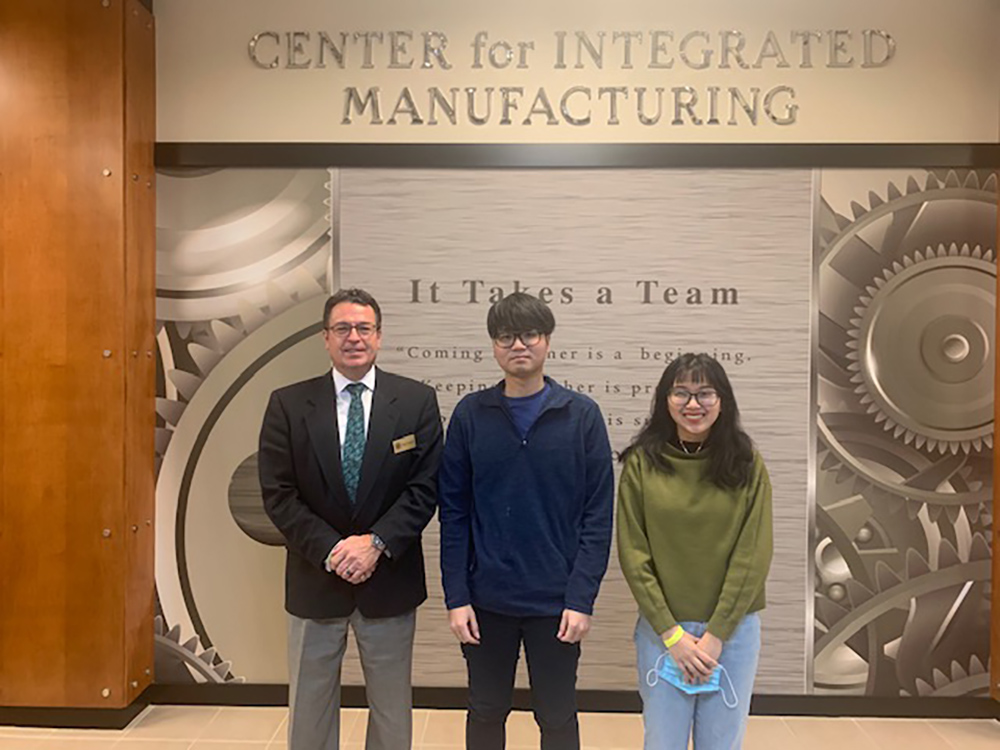Contributed by Mackenzie Reese
In early January, Southern Union President Todd Schackett sat down for lunch with Khanh and Thang Le.
The siblings from Vietnam were interested in getting their GED and entering Southern Union.
As they ate, Schackett asked them about what they wanted in life and what their dreams were. He slowly began to craft a plan of attack to help the siblings achieve it.
After lunch, he took them on a tour of Southern Union’s buildings showing Khanh and Thang glimpses of a future that became more obtainable with each second they spent talking about it.
Khanh and Thang Le are two of 19 students currently enrolled in Southern Union’s Mentorship Program. The program, offered through the college’s adult education department, is an educational support system geared towards non-traditional students receiving guidance through college difficulties.
The program’s goal is to foster students’ mindsets and help them learn that no matter where they start, they can go as far as they can dream; a GED is not terminal. Instead, it’s the beginning of an educational pathway that opens the doors to opportunity.
The mentorship’s framework is structured over two years. A student will be provided a mentor to help guide them through getting their GED, transfer into a general college and build connections in their chosen field.
Each mentor’s goal is to identify the roadblocks that could potentially stop their mentees from wanting to continue their education. It will also create a system that allows students to meet successful workers in the field they wish to pursue.
Currently, there are 19 mentees and mentors in the program as it works on transferring students into the Academic, Health Sciences and Technical Pathways at Southern Union. All the mentors are currently staff at Southern Union. The community college expects more students to join, hoping that eventually, each mentor will have up to three to four mentees.
Troy Kelly, one of the founders of the program, hopes that eventually the students in the program can work together and become a cohort where they can go to each other and their mentor for support.
Tyler Nelson came up with the idea in early February, inspired by his non-traditional college path and understanding that poverty directly correlates with a lack of education.
Nelson dropped out of school in the tenth grade to work in the cotton mills. Quickly realizing this is not the path he wanted to continue, he went to Southern Union, where he entered the Circle of Care and joined their support system. They helped him receive his GED and lead him to the army, where his brothers gave him the ambition to keep going.
Later, he graduated with his Bachelors in English Education at Auburn University, continued to achieve his Masters as an Educational Specialist and is currently completing his Doctorate.
He claims that the younger generations of his family now look at him for inspiration. “If me being a mentor helped my family, imagine what it can do on a bigger scale,” said Nelson.
The mentor stories build a connection with their mentees, making what seemed to be an unattainable goal become more reachable.
Kendall Yates, coordinator of the Therapeutic Message Program at Southern Union, believes that there is a connection between non-traditional students and first-generation college students. The mentorship allows them to be guided through financial aid and form professional relationships that would not have been there before.
Yates is currently working with a mentee going into the Child Development Path. Her mentee has allowed her to build connections of her own and learn about other Southern Union programs.
“This is awesome,” she said when asked about her thoughts on the program, “education is the only thing no one can take away from you, and it’s important that students can have the tools to get it.”
Joseph Halsey, another mentor in the program, had similar thoughts saying, “it’s always been important to me to be able to help students succeed.” He believes the program is important because students will be able to learn through the experience of others, saying that “sometimes it’s a lot less money and pain to get help when you need it.”
The program is very flexible in time commitment. Mentees can meet with their mentors as little as 30 minutes a month. It is up to the student to decide how much help they want. The program is also adaptable regarding mentors. “We can transfer a mentee to a different mentor if it’s not working out for them,” said Kelly.
All the mentors have positive things to say about the mentees. “They are highly motivated and want to succeed,” Kelly said.
Khan and Thang Le, the two siblings who sat down with Shackett at the beginning of January, are now about to take their GED and meet workers in their dream professions.
While the youngest age a mentee can be to join the program is 17, most are a lot older and have outside pressures on them that motivate them to be their best.
These mentees are people like the Le siblings who want to make a difference in their lives and the world, but need a little help getting there.
Khan, who aspires to be a nurse, states, “the [mentorship] program is helping me pursue my dreams and is the first step I need to take to achieve them.”
This is only the beginning of Southern Union’s mentorship program. Shackett hopes that one day all Southern Union students will have the opportunity to have a mentor. “I want to do this with every student,” Schackett said.
“Knowledge is meant to be shared,” Yates said regarding the program. By having Mentees and mentors, the Southern Union community can grow, and the people inside it can reach new potentials due to their combined knowledge.

